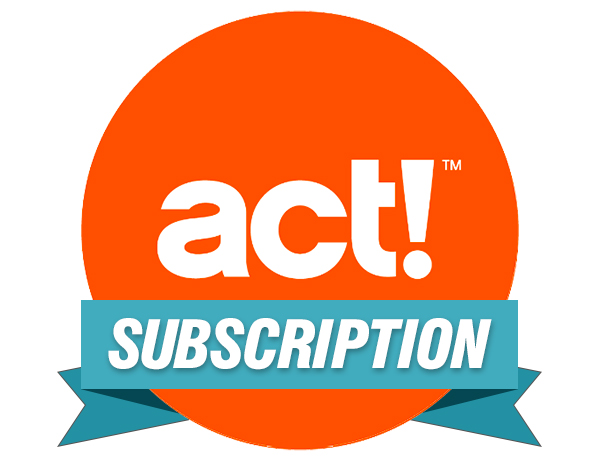Prior to May 2015, Swiftpage (and Sage before them) sold Act! as a perpetual license, which is to say customers paid one price and then often drove it into the ground, or until compatibility issues or the allure of new features compelled them to upgrade. Once subscription was introduced, Act! became less expensive to get into, with recurring expenses many found easier to budget for. As much as people loved owning the software, subscription reduced the barrier to entry and made costs more manageable on a year-to-year basis, as well as easier to write off for tax purposes.
However, despite the entire CRM industry going this direction, there is a bit of muscle memory built up over 30-years with our customers that still compel them to "own" their software. While I understand the "own vs lease" mentality (I'm that way with cars), it is no longer an attractive way to acquire Act!, or any CRM for that matter.
To fully appreciate the value & virtues of Act! subscription vs purchasing, you have to consider the following factors.
- The Cost for Perpetual Licenses: If you're an off-plan customer, meaning you were previously on subscription but opted out in favour of using your perpetual licensing, the cost for adding additional licensing is now $1050. This is steep, and these same people would be entitled to the current "Winback" pricing of $300/year/user, so the perpetual license would cost them 3.5x the price of a new subscription seat. Given this also equates to 3+ years of renewals, well beyond most past users upgrade cycle, this is a difficult purchase to justify.
- Unsupported Perpetual Licenses: All customers owning perpetual licenses of past Act! products are not eligible to purchase additional seats, only those who have supported versions of Act!, meaning one of the past three major releases of Act!. You can learn more about the Act! Obsolescence Policy HERE, but the gist is once an Act! version becomes unsupported, or falls outside of the Obsolescence Policy, it is no longer available for purchase - at any price.
For context, Act! v19 officially became obsolete at the end of November 2019, but ceased to be available for purchase at the end of September, meaning if you needed an extra Act! v19 seat for your team, it was not available. Imagine using a CRM to grow your business, only to discover that due to poor purchase decisions, you could not actually grow your team? Despite spending big bucks for the comfort of perpetual licenses, you're now forced to either upgrade the whole team's licensing to a supported version, or relegate some users to "browse" licenses in order to make room for the new team members. Needless to say, this is not a growth strategy. - Supported Perpetual Licenses: If you have perpetual licensing of a supported version of Act! it's a little easier, but still painful. Each new user in this scenario would cost business owners a whopping $1050, with the knowledge that the life cycle of that version (based on the point made above) could actually be quite short. Imagine having bought an extra seat of Act! v19 last year for $1050, only to discover the same licenses are no longer available. It's counter-intuitive to plan for growth when your CRM doesn't support it.
- Time Capsule: It's easy to see how perpetual licenses, when you consider their cost & limited shelf-life, are not actually "perpetual" at all, unless you imagine your business to be in a time capsule. Sure, the software will keep running at no additional cost, but the investment doesn't support changes to your team or your working environment, like new versions of Windows or Office. For example, Windows 7, SQL 2008, and Server 2008 were all recently deprecated by Microsoft (read more HERE), meaning upgrading any of them could imperil your continued use of some legacy versions of Act.
Consider the following setup scenarios:
- Act! v17 or older did not support an upgrade to Windows 10
- Act! v16 or older did not support an upgrade to SQL 2014
- Act! 2012 or older could not support an upgrade to Windows Server 2012
Other factors unrelated to cost or licensing:
- Support: Act! Subscribers get Swiftpage support, but perpetual license holders do not. In fact, unlike in the past, Swiftpage support plans are not available to any off-plan customers holding perpetual licenses.
- Lost Features: Setting aside being denied features in the newer Act! releases, perpetual license holders also lose access to the core subscriber perks that they previously had which run off Act's WebAPI . Features like Act! Marketing Automation, Dynamic Pipelines, Graphical reporting with Insights, Act! Connect Link, Act! Companion, and Zapier connectivity, to say nothing of a growing family of powerful 3rd party add-ons like Book2act, Act4mail, Webplanner, and Handheld Contact API, that extend the capabilities of Act! CRM. The WebAPI will also support future Swiftpage programs like Nexus (their soon-to-be-released Progressive Web App).
No one loves recurring annual costs, but limiting your business growth potential and "time-capsulling" your business-critical software to avoid them is an impractical and myopic strategy that can end up costing customers more money in both the short and long term, while denying their team key CRM productivity features and options.

